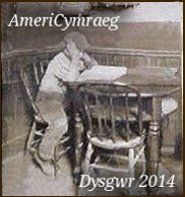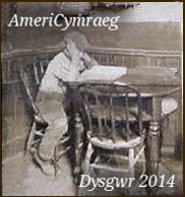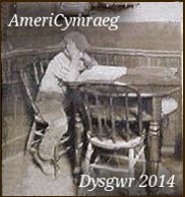More Here - dysgwr2014
 A quick post tonight, it's Saturday night, traditionally a time to raise a few cyrfau. I wanted to draw attention to an email I received on the site today about pronunciation . Here is the text:-
A quick post tonight, it's Saturday night, traditionally a time to raise a few cyrfau. I wanted to draw attention to an email I received on the site today about pronunciation . Here is the text:-
Just a wish sent your way for Welsh Phrase of the Day. If an idea on how to pronounce the phrase would also be included it would help.
So after due consultation with Brett we have decided to add occasional sound files to assist absolute beginners in this area. Please feel free to add a sound file whenever you post a phrase or sentence in the blog.
I added the first of these tonight:- "mae hi'n bwrw glaw heddiw". It's a .wav file so I hope it plays ok and I hope my pronunciation is not too awful. It only takes a second to make a recording and we hope more of our followers will feel inclined to contribute. Whatever you do....cael hwyl 
Here is the sound file:- bwrwglaw.wav
Click here or below to for the 'How To Enrol For AmeriCymraeg 'page
More Here - dysgwr2014
 Back in the 90's I used occasionally to attend Welsh language courses. I never lasted long and always found an excuse to drop out, usually because of time pressure or for financial reasons.
Back in the 90's I used occasionally to attend Welsh language courses. I never lasted long and always found an excuse to drop out, usually because of time pressure or for financial reasons.
I did, however, pick up a smattering of Welsh and imagined, because I had mastered a few phrases, that I was ready to go forth and test my vocabulary and comprehension in the real world.
It so happened that one year I set out with a companion to walk the Rhinogs , a grim but magnificent range in Snowdonia, which boasts some of the roughest hill walking country in Wales. Situated in the Harlech Dome, the Rhinogs are frequently shrouded in mist and home to little more than the occasional sheep farm.
It was on a misty day somewhere south of Maentwrog that my companion and I admitted we might be lost and sought directions from a sheep farmer we were lucky to encounter on the barren hillsides.
This was my big chance. I said, "Dyn ni'n mynd i Maentwrog. Ble mae'r Maentwrog?"
Our new found friend began talking rapidly in fluent Welsh pointing ( fortunately ) in the general direction of Maentwrog and no doubt, supplying us with a detailed account of every major obstacle and landmark we would encounter en route. All wasted! After several minutes he came to a halt and smiled. I smiled back, waved and said, "Diolch yn fawr."
After leaving our helpful guide a safe distance behind in the mist my companion turned to me and enquired smugly, "You didn't understand a ******* word of that did you?"
I hung my head and muttered, "No...not a ******* word."
And so....if there is a moral to this tale it is this. Join AmeriCymraeg now before you too get lost in the Rhinogs!
Click here or below to for the 'How To Enrol For AmeriCymraeg 'page
More Here - dysgwr2014
 A short post tonight to introduce a major new feature on AmeriCymru which we hope will be an asset to Welsh learners.
A short post tonight to introduce a major new feature on AmeriCymru which we hope will be an asset to Welsh learners.
Throughout 2013 AC member Brett Hull has maintained his excellent Welsh Word of the Day (Gair Cymraeg y dydd)
blog. He has listed one new Welsh word a day and we have encouraged members to come up with a sentence featuring that word. We would like to thank Brett for his contribution and commend him for his creativity in taking the idea one step further for 2014.
I dont want to steal his thunder but I know that tomorrow Brett will be announcing his new Welsh Phrase of the Day blog which will run through 2014. This will give our members and readers the chance to learn a new phrase each day and, should they choose to, post a sentence incorporating that phrase in comments on the page. Stay tuned for Brett's announcement tomorrow.
Diolch yn fawr Brett....looking forward to the new blog
Click here or below to for the 'How To Enrol For AmeriCymraeg 'page
An Interview With Helen Forder, Author of ''High Hats And Harps''
...
"According to some, Lady Llanover was the best friend Wales ever had!"
AmeriCymru spoke to Helen Forder, author of ''High Hats And Harps'', a new book on the life and times of Lady Llanover, a 19th century champion of the Welsh harp and Welsh culture in general.
Buy ''High Hats And Harps'' here
...
...
AmeriCymru: Hi Helen and many thanks for your recent book ''High Hats And Harps''. Care to introduce the subject of the book, Lady Llanover, for our readers?
Helen: According to some, Lady Llanover was the best friend Wales ever had! She was born Augusta Waddington, 6th and last child, all daughters, of Benjamin Waddington and Georgina Mary Anne (née Port). Although English, Benjamin and Georgina had come to live in Wales (Llanover, near Abergavenny, MON.) where Augusta was born on 21st March 1802. Only two of her sisters, Frances and Emilia, had survived beyond infancy, and Emilia later died a young woman, not long after she had married. By this time Frances had married and moved abroad, leaving only Augusta living with her parents.
In 1823 Augusta married Benjamin Hall (III), the son of a family living at nearby Abercarn. They were devoted to each other and shared a love of Wales, its people and its traditions. Throughout their lives they used their position and wealth to champion Welsh culture.
Their social status rose gradually, Benjamin being created a baronet in 1838, and then raised to the peerage in 1859, becoming Lord Llanover of Llanover and Abercarn.
Sadly, Benjamin died in 1867, but Augusta continued the campaign to preserve the Welsh culture and traditions throughout the long years of widowhood. She died in 1896, in her 94th year.

Helen: Although unknown to many, Lady Llanover’s name has been familiar to me all my life thanks to my mother’s stories of her mother and grandfather. Her mother, Elizabeth Ann Williams, Nanny to us, was a member of Lady Llanover’s band of harpists and Mum would show us a photograph of Nanny, sitting at her triple harp while telling us of the time she won ‘the eisteddfod’ playing the instrument. Her grandfather was Lady Llanover’s under-agent.
AmeriCymru: How important was Lady Llanover''s contribution to the preservation and popularisation of the Welsh harp?
Helen: Lady Llanover learned to play the harp, having lessons from Elias Parish-Alvars, but it is thought that her interest in the ‘Welsh’ triple-stringed harp was aroused in 1826 when she attended the Brecon Eisteddfod where she heard John Jones play the instrument so beautifully. Later, John Jones became the Llanover family harper, after the building of Llys Llanover was completed. The position of family harper was maintained for the rest of Lady Llanover’s life.
AmeriCymru: Lady Llanover was often in dispute with another well known harpist from the period, John Thomas. Care to elaborate?
Helen: At the age of twelve John Thomas won the chief prize of a triple harp at the Abergavenny Eisteddfod of 1838. He attracted the attention of Lady Ada Lovelace, Byron’s daughter, who helped him financially to attend the Royal Academy of Music in London, where he more or less abandoned the triple harp, which was played on the left shoulder and, changing shoulders, he learned to play the pedal harp, which is played on the right. A very able student, John found fame at home and abroad with his playing and his compositions. Lady Llanover encouraged him, but when she began her campaign to save the triple harp, he found he could not support her wholeheartedly, as he saw the benefits of the pedal harp and the limitations of the triple.
Lady Llanover was angry with him, seemingly offended that he did not share her enthusiasm for promoting the triple harp, but he regretted the tension between them, saying that this had risen mainly from his ‘inability to view matters connected with [his] artistic pursuits in the same light as herself.’ However, he never forgot her kindness towards him at the start of his career.
Undoubtedly their relationship became strained, but in her nineties Lady Llanover, while in London, attended a Welsh concert arranged by John Thomas, when ‘twenty harps played by ladies in white’ were heard. Doubtless they were pedal harps. Perhaps more has been made of their ‘bitter quarrel’ than was true!
John Thomas had not completely abandoned the triple harp. At the Swansea Eisteddfod of 1863 it was announced that he had secured sufficient money from people such as Lady Llanover, Maria Jane Williams and the Dowager Duchess of Dunraven to establish a triple harp scholarship for ten- to eighteen-year-olds.
AmeriCymru: What was her greatest achievement and what in your opinion can we learn from Lady Llanover''s example?
Helen: Some years ago one might have been justified in thinking that in spite of her life-long efforts Lady Llanover had fought a losing battle. When I was a schoolgirl our music teacher told me there was no such instrument as a triple harp! I knew there was – we had a photograph of ‘Nanny’ with hers, but one did not argue with teachers in those days!
In spite of my grandmother having spent some years, from the age of twelve, living under the ‘Llanover influence’ I never heard her speak Welsh, although Welsh was her family’s first language; and although my mother was brought up as a Welsh speaker she never spoke to us in the language, and we children were actively discouraged from taking Welsh lessons in school. At least she kept the name Lady Llanover and knowledge of the triple harp alive with her stories of her mother and her grandfather and their time at Llanover.
As far as the women are concerned, Lady Llanover did not ‘invent’ the Welsh costume, as many people think, but she did create a Llanover ‘livery’, which is what today’s national costume seems to be based upon. While picturesque, the Welsh costume is not practical today, so it is hardly surprising that it is only worn at eisteddfodau and other Welsh cultural events. However, when it comes to the costume for men, one only has to look at what her family harpers had to wear to realise that costume design was not one of her talents!
Welsh folk dances, however, continue today, with Folk Dance Societies keeping some of the old dances, which were danced at Llanover, alive, for example, Rhif Wyth and the Llanover Reel.
One has the impression here in Wales that there is a resurgence of interest in Welsh culture. Many people are attending language classes, and the harp is a very popular instrument. Thanks to people like Llio Rhydderch ( www.lliorhydderch.com ) and Robin Huw Bowen ( www.teires.com ) the triple harp is alive and well! The first triple harp ‘choir’ since 1913 was formed a few years ago, and they have produced a wonderful CD of toe-tapping music. Consisting of five fine triple harpers, they are carrying on the tradition.
So, in spite of many years in the wilderness, Lady Llanover’s efforts seem to be bearing fruit. Long may it continue. Oes y byd i’r iaith Gymraeg.
AmeriCymru: Whats next for Helen Forder?
Helen: What Next? My website - http://augustaladyllanover.coffeecup.com – is very much in need of updating, so I must spend time on that! Also, I have two harps, a guitar, a piano and a recorder, all rarely played! It is time I settled down to some serious practice. Maybe I will begin again with the harp, not a Welsh triple-stringed harp I am sorry to say, but I know many Welsh tunes to practise.
AmeriCymru: Any final message for the readers and members of AmeriCymru?
Helen: Lady Llanover’s mother had been brought up by her great-aunt, Mrs Patrick Delany, who had said, ‘I like, and love, and dislike with all my might’. Georgina exhorted her daughters, ‘Whatever you do, do it with all your might’. This was what Lady Llanover did.
To all my Americymru friends who are trying to learn the old language, ‘Daliwch ati’. – keep at it. The language is well worth saving from extinction, as is the triple harp, and other aspects of Welsh culture.
....
....
More Here - dysgwr2014
I attended my first session of AmeriCymraeg as a student today. In the past I have hovered in the background, ready to field requests for technical or administrative support but did not take part in the classes. That being the case, this is an excellent opportunity to thank John Good for being the excellent instructor that he is and to thank our students old and new for taking the trouble to learn Welsh in 2014....Diolch yn fawr pawb.
Tonight we concentrated on basic pronunciation and vocabulary and straight off the bat I learned something very useful. Mutations are the bane of many a Welsh learners existence and I am no exception. I have attended a few classes in the past and at some point tutors always asked students where they lived as part of a class exercise. Now at the time I lived in Cardiff, but 'in Cardiff' in Welsh is not straightforwardly, 'yn Caerdydd' but the rather viciously unpronounceable 'yng nghaerdydd'. No one ever told me that I did not need to pronounce the second 'ng' which is a nearly impossible feat! That second 'ng' is silent so that the correct pronunciation is, more or less phonetically - ung-hire-dydd - which is perfectly manageable.
Never again will I have to resort to Wenglish and answer "Caerdydd inni?" when asked in Welsh, where I was born or where I lived before migrating to the US.
Now of course, since I live in Portland I will have to master the pronunciation of 'ym Mhortland', or move somewhere that starts with a safer letter
Click here or below to for the 'How To Enrol For AmeriCymraeg 'page
More Here - dysgwr2014
I remember as a schoolboy being introduced to palindromes. My history teacher chalked the immortal sentence 'Able was I ere I saw Elba' on the board in the course of a lesson on Napoleon and his exile in 1814. I've loved them ever since and was delighted to discover many years ago during one of my frequent attempts to learn Welsh that the word for 'now' in Welsh is 'nawr' or 'rwan' .
There is a graphic which goes some way toward explaining this on this page:-
http://caterpillarandredpostboxes.tumblr.com/post/23497124939/nawr-v-rwan
'Nawr' is used in south Wales and 'rwan' in the north. I remember hearing the word used many years ago on a walking trip in north Wales. I was at the breakfast table at the Inn where I was staying when I heard the landlord announce to his wife - "Dwi'n mynd i siopa rwan".
Of course whether you adopt the north or south Walian pronunciation neither can be enunciated without rolling the 'r'....nawrr or rrwan.
I cant help wondering how this situation arose? Is there anyone with a knowledge of Cymric etymology who can offer an explanation? Is there an explanation?
Anyway, in pursuance of my new years resolution, which is to master basic conversational Welsh by the end of 2014, I am looking forward to John Good's AmeriCymraeg class tomorrow evening at 5.00pm ( Pacific Time ). This will be the first class that I have attended as a student rather than as an administrative overseer and I will be blogging my progress throughout the year in my series of dysgwr2014 blog posts. I hope to be composing the blog in both Welsh and English by the end of the year so keep checking back for daily updates. Better still click the graphic below to join AmeriCymraeg and make 2014 the year that you learn Welsh
 Storyteller: Liz Warren, Musician: John Good, 50 mins playing time, price $9.99
Storyteller: Liz Warren, Musician: John Good, 50 mins playing time, price $9.99
The Story of Pwyll and Rhiannon
The stories that comprise the Mabinogion were written down sometime between 1160 and 1220 A.D. in Wales. They seem to have been written for a sophisticated, courtly audience. It is unknown whether their author created them in this form or if they were already current in the repertoires of medieval Welsh storytellers. Scholars agree, however, that the elements, characters, and ideas from which the stories are built reflect much older and more widely spread Celtic beliefs. The story of Pwyll and Rhiannon in particular introduces us to ancient concepts of the otherworld and sovereignty while showing us how a proper medieval Welsh prince should behave.
All the stories in the Mabinogion explore the themes of friendship, marriage, and feuds. The First Branch, the story of Pwyll and Rhiannon, begins with a feud which Pwyll resolves and in so doing makes an important friendship and alliance with the otherworld. This connection enables him to meet and ultimately marry Rhiannon, who represents sovereignty. Throughout their relationship Rhiannon must first endure Pwyll’s impulsiveness and lack of experience and later must bear an unjust punishment during which she is distanced from her husband and her royal role. This separation and her ultimate redemption is an element of most Celtic sovereignty myths.
Through the story, Pwyll grows in maturity and wisdom, reflected in his efforts to balance the demands of the nobles of his court with his love for Rhiannon. By the end of the story when he and Rhiannon are reunited with their child, Pwyll has proven himself a just and wise leader and she has shown her eternal nature by surviving and rising above injustice. Together they have proven their fertility, thereby assuring the fertility and productivity of the land, while providing an heir to continue their good works. Listen to a sample from the album in the pop up player below.
Characters and Pronunciation Guide
Pwyll (Pweeth): Prince of Dyfed, Head of Annwfn. His name means caution or wisdom.
Arawn (Ah-roon): King of the Otherworld
Hafgan (Hav-gan): Defeated King of Annwfn. His name means ‘summer song’.
Rhiannon (Hree-an-on): Pwyll’s otherworldly bride, horse goddess, and bestower of sovereignty. Her name comes from a Celtic term meaning high queen.
Hefaidd Hen (Hev-ay -ith Hen): Rhiannon’s father.
Gwawl (Goo-awl): Rhiannon’s rejected suitor.
Teyrnon (Tir-non): The best man in all the world.
Pryderi (Prud-er-ee): Pwyll and Rhiannon’s son. His name means anxiety.
Cigfa (Keeg-vah): Pryderi’s bride.
Other Terms
Mabinogion (mab-i-no-gee-on): Collective name for eleven medieval Welsh mythic stories.
Dyfed (Duv-ed): Pwyll’s realm in south-west Wales.
Gorsedd Arberth (Gor-seth Ar-burth): The magical mound of Arberth.
Cantref (kan-trev): Medieval Welsh administrative district of 100 villages.
More Here - dysgwr2014
 I may be guilty of sending conflicting signals in my posts on New Years resolutions last year. I seem to recall posting on Facebook that I would "stop kidding myself that I have any will power". On Twitter I announced that 2014 was the year to learn Welsh.
I may be guilty of sending conflicting signals in my posts on New Years resolutions last year. I seem to recall posting on Facebook that I would "stop kidding myself that I have any will power". On Twitter I announced that 2014 was the year to learn Welsh.
Well, the above mentioned tweet was picked up by the UK Daily Express who deemed it the most "eye-catching" of the season. This puts me in a spot. I cannot really exhort others to 'Learn Welsh' and join our online class without doing so myself!
And so it is with some trepidation that I hereby pledge to master the Welsh language to at least basic conversational level by the end of this year.. I say 'with trepidation' because I have tried before, several times, and failed a month or two after making the initial effort. But this year will be different! I plan to launch a blog and track my progress by discussing some aspect of the Welsh language daily between now and December 31st. At the outset the blog will be written in English rather than Welsh but by years end I hope to write in both languages without recourse to Google Translate.
I'd like to finish this inaugural post with an exhortation. If you have been toying with the idea of learning Welsh please consider joining John Good's AmeriCymraeg online Welsh class.
You couldn't wish for a better or more dedicated instructor and there are live online sessions once a week on Wednesday evenings ( 5-7 pm PST ). The courses cater for beginners and intermediate level learners. Class sizes are small so every student gets plenty of individual attention. Click the graphic below for more details AND remember that the first class of 2014 is on Wednesday 8th of January. So...if you are thinking of enrolling sign up now or email americymru@gmail.com for more details.























